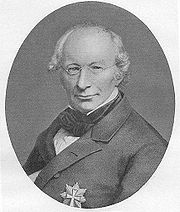
Johan Nicolai Madvig
Encyclopedia

Denmark
Denmark is a Scandinavian country in Northern Europe. The countries of Denmark and Greenland, as well as the Faroe Islands, constitute the Kingdom of Denmark . It is the southernmost of the Nordic countries, southwest of Sweden and south of Norway, and bordered to the south by Germany. Denmark...
philologist and Kultus Minister
Kultus Minister of Denmark
The Kultus Minister of Denmark was a Danish minister office. The responsibilities of the minister was the church, culture and education. The word kultus is Latin for adoration, from which the words culture and cult are derived....
.
He was born on the island of Bornholm
Bornholm
Bornholm is a Danish island in the Baltic Sea located to the east of the rest of Denmark, the south of Sweden, and the north of Poland. The main industries on the island include fishing, arts and crafts like glass making and pottery using locally worked clay, and dairy farming. Tourism is...
. He was educated at the classical school of Frederiksborg and the University of Copenhagen
University of Copenhagen
The University of Copenhagen is the oldest and largest university and research institution in Denmark. Founded in 1479, it has more than 37,000 students, the majority of whom are female , and more than 7,000 employees. The university has several campuses located in and around Copenhagen, with the...
. In 1828 he became reader, and in 1829 professor of Latin
Latin
Latin is an Italic language originally spoken in Latium and Ancient Rome. It, along with most European languages, is a descendant of the ancient Proto-Indo-European language. Although it is considered a dead language, a number of scholars and members of the Christian clergy speak it fluently, and...
language and literature at Copenhagen
Copenhagen
Copenhagen is the capital and largest city of Denmark, with an urban population of 1,199,224 and a metropolitan population of 1,930,260 . With the completion of the transnational Øresund Bridge in 2000, Copenhagen has become the centre of the increasingly integrating Øresund Region...
, and in 1832 was appointed university librarian. In 1848 Madvig entered parliament as a member of the "Eider-Danish" part—those who desired the Eider
Eider River
The Eider is the longest river of the German state of Schleswig-Holstein. The river starts near Bordesholm and reaches the southwestern outskirts of Kiel on the shores of the Baltic Sea, but flows to the west, ending in the North Sea...
to be the boundary of the country. When this party came into power Madvig became Kultus Minister in the Cabinet of Moltke II
Cabinet of Moltke II
The Cabinet of Moltke II was the government of Denmark from 16 November 1848 to 13 July 1851. It was also referred to as the November Cabinet.It was replaced by the Cabinet of Moltke III on 13 July 1851.-List of ministers and portfolios:...
and III, but left the cabinet on 7 December 1851 as a protest against the government's unity state program. In 1852 be became director of public instruction.
Some years later, from 1856 to 1863, Madvig was president of the Danish parliament and leader of the National Liberal Party
National Liberal Party (Denmark)
The National Liberal Party , was a Danish political party or political movement from the 1830s until about 1880.Often considered "the first Danish political party" the National Liberals were gradually founded as the opposition against the Danish absolute monarchy...
. With these brief interruptions the greater part of his life was devoted to the study and teaching of Latin and the improvement of the classical schools, of which he was chief inspector. As a critic he was distinguished for learning and acumen. He devoted much attention to Cicero
Cicero
Marcus Tullius Cicero , was a Roman philosopher, statesman, lawyer, political theorist, and Roman constitutionalist. He came from a wealthy municipal family of the equestrian order, and is widely considered one of Rome's greatest orators and prose stylists.He introduced the Romans to the chief...
, and revolutionized the study of his philosophical writings by an edition of De Finibus (1839). Perhaps his most widely known works are those on Latin grammar
Grammar
In linguistics, grammar is the set of structural rules that govern the composition of clauses, phrases, and words in any given natural language. The term refers also to the study of such rules, and this field includes morphology, syntax, and phonology, often complemented by phonetics, semantics,...
and Greek syntax
Syntax
In linguistics, syntax is the study of the principles and rules for constructing phrases and sentences in natural languages....
, especially his Latin grammar for schools (Eng. trans. by G Woods). Another major contribution to classical scholarship is his Opuscula Academica ('An Academic Trifle').
In 1874 his sight began to fail, and he was forced to give up much of his work. He continued to lecture, and in 1879 he was chosen rector for the sixth time. In 1880 he resigned his professorship, but went on with his work on the Roman constitution, which was completed and published before his death. In this book Madvig takes a strongly conservative standpoint and attacks Theodor Mommsen
Theodor Mommsen
Christian Matthias Theodor Mommsen was a German classical scholar, historian, jurist, journalist, politician, archaeologist, and writer generally regarded as the greatest classicist of the 19th century. His work regarding Roman history is still of fundamental importance for contemporary research...
's views on Caesar
Julius Caesar
Gaius Julius Caesar was a Roman general and statesman and a distinguished writer of Latin prose. He played a critical role in the gradual transformation of the Roman Republic into the Roman Empire....
's programme of reforms. It is a clear exposition, though rather too dogmatic and without sufficient regard for the views of other scholars. His last work was his autobiography, Livserindringer (published 1887).
One of his textbooks, on Latin syntax, has been re-issued as recently as in 2001.

